This article was co-authored by Justin Barnes. Justin Barnes is a Senior Home Care Specialist and the Co-Owner of Presidio Home Care, a family-owned and operated Home Care Organization based in the Los Angeles, California metro area. Presidio Home Care, which provides non-medical supportive services, was the first agency in the state of California to become a licensed Home Care Organization. Justin has over 10 years of experience in the Home Care field. He has a BS in Technology and Operations Management from the California State Polytechnic University - Pomona.
wikiHow marks an article as reader-approved once it receives enough positive feedback. In this case, 92% of readers who voted found the article helpful, earning it our reader-approved status.
This article has been viewed 53,301 times.
People can live in residential care for a variety of reasons, including needing some assistance due physical disabilities or general old age. Whatever the reason they need care, encouraging independence is a key part of providing a healthy and enlivening home life. While we tend to think of independence as simply being able to take care of yourself at home, independence also includes doing things that make life fulfilling, such as physical activity and social interaction.
Steps
Providing Tools and Support For Independence
-
1Provide adaptive tools for daily tasks. One of the easiest ways to promote independence is to give people the equipment they need to complete simple movements or tasks. For instance, providing residents with reaching tools can allow them to grab items on their own that they otherwise could not reach.[1]
- For example, giving a person with limited stretching and bending ability a dressing stick or grabber can help them dress themself.
-
2Install adaptive equipment in the resident's room. In addition to using simple tools, some equipment can be installed that will help a person to be independent. For example, installing handrails in a shower and next to a toilet may help a resident to shower and go to the bathroom on their own without a huge risk of injury.[2]
- Other examples of adaptive equipment that can be installed include toilet seat lifts, shower benches, ramps, and electric hospital beds.
Advertisement -
3Provide mobility equipment. In some cases, residents in care can benefit from mobility equipment that allows them to move on their own, such as walkers and motorized wheelchairs. Even residents that can walk may be able to be more independent if they have access to a scooter or other mobility aid.[3]
-
4Encourage residents to use adaptive tools and equipment. There are typically a variety of daily tasks that people in residential care can and should do themselves. While you can't force someone to use the tools you provide that make these tasks easier, you can gently encourage them to use them. This can help the resident gain the confidence they need to do the tasks themself.[4]
- While it is an important part of independence to allow residents to decide what they will and will not do, it can be very beneficial to give support and encouragement. You need to walk a fine line here between being overbearing and giving the person the encouragement and self esteem they need to be more independent.
Encouraging Physical Activity
-
1Encourage daily physical activity and exercise.[5] Daily activity can strengthen a body and allow someone to move more independently. Even if a person has physical limitations, they should still get some level of physical activity every day. This can range from small movements or walking a few feet to a variety of exercises, including yoga and water exercise.
- Daily exercise gives people a boost to their physical strength and can also be a lively social activity. Try to encourage exercise options that are social as well as physical.
-
2Provide access to a variety of physical activities. Encouraging independence should include giving people the ability to do a wide variety of activities for fun. Providing a wide variety of activities, such as gardening, taking walks, and dancing, will potentially give a resident physical and mental stimulation and will encourage independence.
- This could include having activities at the care center and providing transportation and support to do activities outside of the facility.
- Weekly (or more often) group outings are a good way to provide access to physical activities outside of the facility. These outings can be to a wide variety of places, including shopping areas, nature areas, historical points of interest, or other locales nearby.
-
3Make sure physical activities are approved. While encouraging independent physical activity is important, it's imperative to make sure that the activities you encourage will not cause physical harm. Take the resident's physical limitations into consideration when planning activities.[6]
- In general, prioritize low-impact exercise, such as gardening or walking, over high-impact exercise, such as running.
Improving Social Independence
-
1Encourage social interaction.[7] There should be a variety of ways that residents in a residential care facility can interact with each other of their own accord. For instance, meals are a key time when a resident can interact with others and form independent relationships with others. Additionally, having areas in the facility where people can watch TV, read, or simply sit together can give people an opening for social interaction.
- Some people in residential care may need help getting to an area where they can interact with others. However, it is typically worth the effort to get them there if they have the opportunity to interact with others.
-
2Make maintaining relationships as easy as possible. When someone moves into a residential care center, it can be hard for them to keep long-standing relationships going. However, providing transportation to visits with old friends and encouraging guests in the facility can go a long way towards the resident maintaining the relationships they have with other people.
-
3Provide access to technology that enables interaction. If a resident is bedridden or unable to leave their room, they can still interact with others out in the world. Investigate types of technology that can help them get some interaction with others, such as a computer or tablet with connection to the internet.
- It may be necessary to provide the resident with training on the technology you are providing. Make sure they know how to use it proficiently so they can use it even when you are not around.[8]
Help Encouraging Healthy Activities in Conversation
Expert Q&A
Did you know you can get expert answers for this article?
Unlock expert answers by supporting wikiHow
-
QuestionHow can we help the elderly maintain independence?
 Justin BarnesJustin Barnes is a Senior Home Care Specialist and the Co-Owner of Presidio Home Care, a family-owned and operated Home Care Organization based in the Los Angeles, California metro area. Presidio Home Care, which provides non-medical supportive services, was the first agency in the state of California to become a licensed Home Care Organization. Justin has over 10 years of experience in the Home Care field. He has a BS in Technology and Operations Management from the California State Polytechnic University - Pomona.
Justin BarnesJustin Barnes is a Senior Home Care Specialist and the Co-Owner of Presidio Home Care, a family-owned and operated Home Care Organization based in the Los Angeles, California metro area. Presidio Home Care, which provides non-medical supportive services, was the first agency in the state of California to become a licensed Home Care Organization. Justin has over 10 years of experience in the Home Care field. He has a BS in Technology and Operations Management from the California State Polytechnic University - Pomona.
Senior Home Care Specialist
-
QuestionWhat activities do the elderly enjoy?
 Justin BarnesJustin Barnes is a Senior Home Care Specialist and the Co-Owner of Presidio Home Care, a family-owned and operated Home Care Organization based in the Los Angeles, California metro area. Presidio Home Care, which provides non-medical supportive services, was the first agency in the state of California to become a licensed Home Care Organization. Justin has over 10 years of experience in the Home Care field. He has a BS in Technology and Operations Management from the California State Polytechnic University - Pomona.
Justin BarnesJustin Barnes is a Senior Home Care Specialist and the Co-Owner of Presidio Home Care, a family-owned and operated Home Care Organization based in the Los Angeles, California metro area. Presidio Home Care, which provides non-medical supportive services, was the first agency in the state of California to become a licensed Home Care Organization. Justin has over 10 years of experience in the Home Care field. He has a BS in Technology and Operations Management from the California State Polytechnic University - Pomona.
Senior Home Care Specialist
-
QuestionHow do you promote a healthy lifestyle if you're elderly?
 Justin BarnesJustin Barnes is a Senior Home Care Specialist and the Co-Owner of Presidio Home Care, a family-owned and operated Home Care Organization based in the Los Angeles, California metro area. Presidio Home Care, which provides non-medical supportive services, was the first agency in the state of California to become a licensed Home Care Organization. Justin has over 10 years of experience in the Home Care field. He has a BS in Technology and Operations Management from the California State Polytechnic University - Pomona.
Justin BarnesJustin Barnes is a Senior Home Care Specialist and the Co-Owner of Presidio Home Care, a family-owned and operated Home Care Organization based in the Los Angeles, California metro area. Presidio Home Care, which provides non-medical supportive services, was the first agency in the state of California to become a licensed Home Care Organization. Justin has over 10 years of experience in the Home Care field. He has a BS in Technology and Operations Management from the California State Polytechnic University - Pomona.
Senior Home Care Specialist Stay physically and physically active. Being as fit and healthy as you can be will help extend your enjoyment of your retirement. This doesn't mean you need to be an athlete. In addition, stay mentally sharp by reading, doing puzzles, and learning new things. Also, maintain social connections. Set up regular visits with people who are important to you. For instance, you could meet up with friends and family for dinners, coffee, or other casual social engagements. You might even have regular dates, like watching a movie together every Friday or going out to eat once a month.
Stay physically and physically active. Being as fit and healthy as you can be will help extend your enjoyment of your retirement. This doesn't mean you need to be an athlete. In addition, stay mentally sharp by reading, doing puzzles, and learning new things. Also, maintain social connections. Set up regular visits with people who are important to you. For instance, you could meet up with friends and family for dinners, coffee, or other casual social engagements. You might even have regular dates, like watching a movie together every Friday or going out to eat once a month.
References
- ↑ https://fvhollandseniorliving.com/news/adaptive-equipment/
- ↑ https://fvhollandseniorliving.com/news/adaptive-equipment/
- ↑ https://medlineplus.gov/mobilityaids.html
- ↑ http://freedom-homehealthcare.com/4-tips-promote-independence/
- ↑ Justin Barnes. Senior Home Care Specialist. Expert Interview. 6 March 2020.
- ↑ https://www.homecarepulse.com/articles/helping-seniors-remain-independent/
- ↑ Justin Barnes. Senior Home Care Specialist. Expert Interview. 6 March 2020.
- ↑ https://journals.sagepub.com/doi/10.1177/153944920402400305
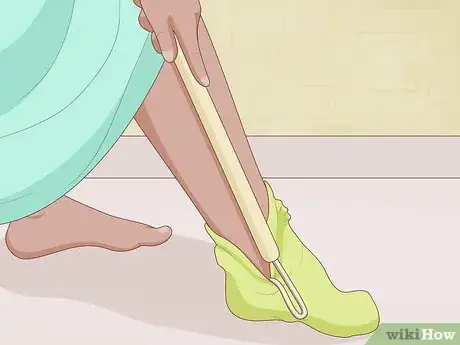

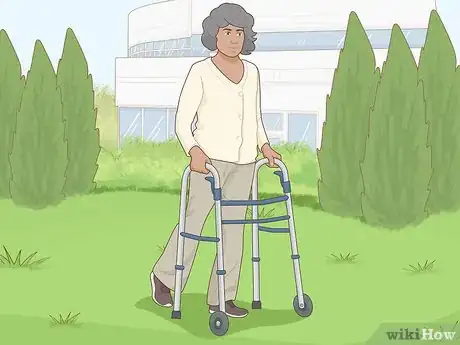
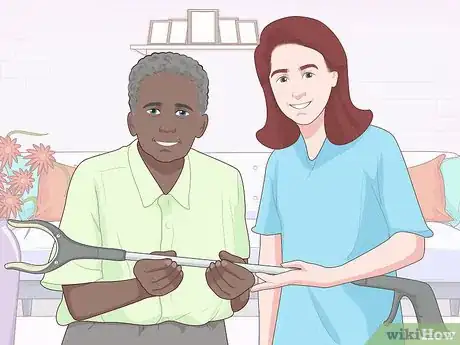
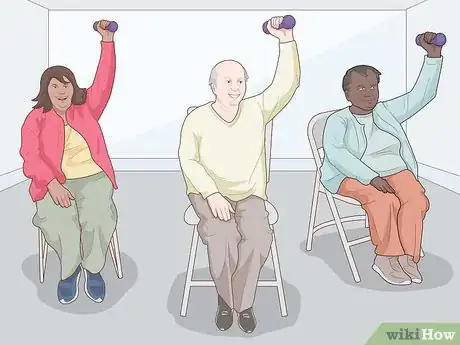

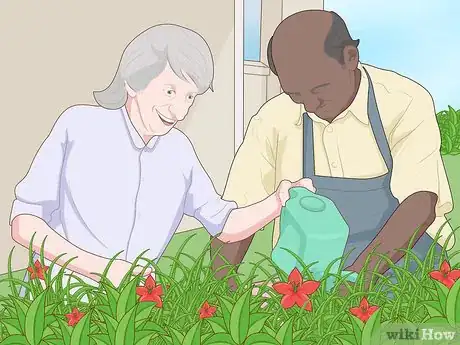
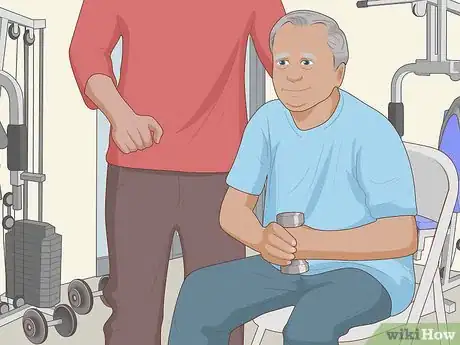

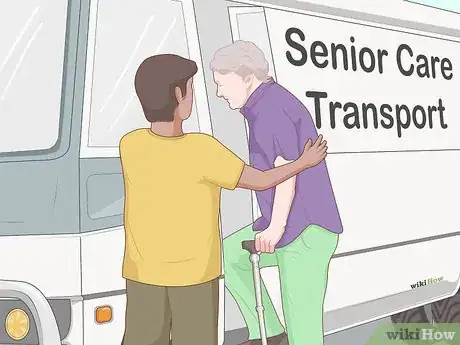
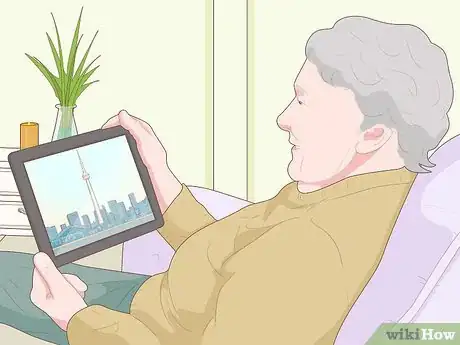

























































Medical Disclaimer
The content of this article is not intended to be a substitute for professional medical advice, examination, diagnosis, or treatment. You should always contact your doctor or other qualified healthcare professional before starting, changing, or stopping any kind of health treatment.
Read More...